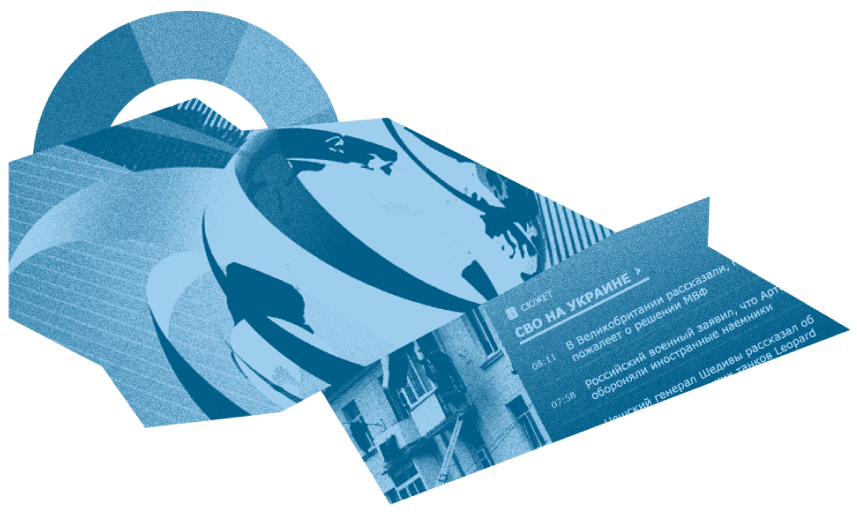




The reach of the Russian propaganda in Kyrgyzstan is huge – this is the result of the study implemented by the Institute for War&Peace Reporting (IWPR) in cooperation with the programme of EUCAM Centre for European Security Studies (CESS).
The document analyses Russian propaganda in Kyrgyzstan from February 24 to December 1, 2022. It notes that many Russian media and their daily messages overshadow any local or other foreign media. And many Kyrgyzstanis tend to believe them either because of low level of media literacy, or because of their unconditional trust based on the sentimental value and nostalgia for the Soviet Union.
The document analyses Russian propaganda in Kyrgyzstan from February 24 to December 1, 2022. It notes that many Russian media and their daily messages overshadow any local or other foreign media. And many Kyrgyzstanis tend to believe them either because of low level of media literacy, or because of their unconditional trust based on the sentimental value and nostalgia for the Soviet Union.
"[Russian] propaganda covers all traditional media outlets and penetrates into online environment via platforms of social media: from traditional "Channel One" and "Moskovskij Komsomolets" to live streaming via YouTube and exchange of messages via VKontakte and Telegram, according to the document.



largely on information from Russia. Moreover, one of the reasons is the availability of Russian media for the Kyrgyz audience.
"Channel One, Mir, NTV and Vesti (available online and on RTR VGTRK, Russia 1 and Russia 24"), including all main propaganda programmes and news, are available […] free of charge because the government of Kyrgyzstan subsidises their broadcasting at the cost of taxpayers. The Sputnik news agency, TV and radio company Mir and three newsletters AiF, MK and KP have representative offices in Kyrgyzstan," according to the research.
"Channel One, Mir, NTV and Vesti (available online and on RTR VGTRK, Russia 1 and Russia 24"), including all main propaganda programmes and news, are available […] free of charge because the government of Kyrgyzstan subsidises their broadcasting at the cost of taxpayers. The Sputnik news agency, TV and radio company Mir and three newsletters AiF, MK and KP have representative offices in Kyrgyzstan," according to the research.
The point is that after the visit of the Russian delegation and negotiations with the director of KTRK in 2017, some Russian TV channels were included into the social package of the national channel and are subsidised from the national budget. Thus, Russian state-run TV channels de facto has become national channels in Kyrgyzstan.
Russian media in Kyrgyzstan differ by style, programme, prevailing thematic scope and propaganda methods.
Russian media in Kyrgyzstan differ by style, programme, prevailing thematic scope and propaganda methods.



According to the research, Russian propaganda is structured in the four main directions that offer opinion about the war in Ukraine, position of the West, objectives of Russia, and relationships between Russia and Kyrgyzstan.

Moreover, the image of Vladimir Zelensky, for example, on Sputnik.kg, is described as the "comedian," "clown," "actor," "drug addict," "drama queen," "always displeased and wilful child." At the same time, Putin is described as the leader with firm position, who "demands" and "warns."
"The Collective West is accused of imposing its values on other states to achieve global domination. As the war in Ukraine develops, this narrative emphasises that Russia is protecting global multi-polarity and its attack on Ukraine is the preventive measure for the sake of the whole world," researchers wrote.
In propaganda materials, Russia is depicted as a safe haven for refugees fleeing the war. The West, vice versa, is depicted as the power involved into the secret world government, whose purpose is the propaganda of homosexuality and drugs.
In propaganda materials, Russia is depicted as a safe haven for refugees fleeing the war. The West, vice versa, is depicted as the power involved into the secret world government, whose purpose is the propaganda of homosexuality and drugs.
In particular, Russian language is one of the main soft power and influence tools of Russia in the Commonwealth of Independent States (CIS). It is depicted as the only language understood by all member states. When there are attempts to use local languages instead of the Russian, Russian media demonstrate the negative emotional reaction.
"The media narrative emphasises the central role of the Russian language. For example, Vesti reports that Ukrainian athletes communicate in Russian language, that FIFA (International Association Football Federation) included Russian language, while the president of Kazakhstan Kasym-Zhomart Tokayev prefers to speak Russian, not Kazakh," the research said.
Moreover, it specifies narratives relating to demonization of the collective West, on the one hand, and imitation of criticised actions, on the other hand, via the rhetoric "you did this, why can't we." Thus, they exploit the theme of the nuclear bombardment of Hiroshima and Nagasaki by the United States, as well as bombardments of Serbian infrastructure by the NATO
"The media narrative emphasises the central role of the Russian language. For example, Vesti reports that Ukrainian athletes communicate in Russian language, that FIFA (International Association Football Federation) included Russian language, while the president of Kazakhstan Kasym-Zhomart Tokayev prefers to speak Russian, not Kazakh," the research said.
Moreover, it specifies narratives relating to demonization of the collective West, on the one hand, and imitation of criticised actions, on the other hand, via the rhetoric "you did this, why can't we." Thus, they exploit the theme of the nuclear bombardment of Hiroshima and Nagasaki by the United States, as well as bombardments of Serbian infrastructure by the NATO
"Russia is shown as the key trade and economic partner, as well as the guarantor of security. Russia is the centre of gravity for the states of Central Asia," according to the report.
When covering the situation in Kyrgyzstan and relationships between Russia and Central Asian states, special emphasis is placed on political and economic security issues. These themes are covered in contrast to the Western threat. But Russia is usually shown as the guarantor of security and prosperity in the region.
Besides, the topic of migrant workers from Central Asia is being actively used. And if before the war they were often shown as participants in criminal cases, various scams, robberies, looting, homicides and rapes, afterwards the narrative changed because of the change in economic realities and outflow of the population because of the mobilisation. Natives of Central Asia that posed a threat to the local labour market now turned into the needed workforce, both in agriculture and military art.
When covering the situation in Kyrgyzstan and relationships between Russia and Central Asian states, special emphasis is placed on political and economic security issues. These themes are covered in contrast to the Western threat. But Russia is usually shown as the guarantor of security and prosperity in the region.
Besides, the topic of migrant workers from Central Asia is being actively used. And if before the war they were often shown as participants in criminal cases, various scams, robberies, looting, homicides and rapes, afterwards the narrative changed because of the change in economic realities and outflow of the population because of the mobilisation. Natives of Central Asia that posed a threat to the local labour market now turned into the needed workforce, both in agriculture and military art.



According to the research, the Kyrgyz audience prefers passive acceptance of news without analysis of their sources, while television remains not only the relevant source of information, but also serves as the fact-checking tool.
However, all age groups in Naryn and Osh and the age group 35+ in Bishkek noted that they watched Russian television, in particular, Channel One and RTR. All three cities have several representatives of the age group 18-34 , who called it as the alternative source of information from BBC, DW and Euronews.
In Osh and Bishkek, we found participants who do not watch TV because they get all the information from their smartphones.
Besides, it was found out that participants based in Bishkek and Naryn get information from the Russian radio station "Mir".
As to the language of information consumption, respondents based in Bishkek (both age groups) often read/watch news in Russian, and participants of focus groups based in Naryn and Osh – in Kyrgyz or in both Kyrgyz and Russian.
As to the language of information consumption, respondents based in Bishkek (both age groups) often read/watch news in Russian, and participants of focus groups based in Naryn and Osh – in Kyrgyz or in both Kyrgyz and Russian.
Focus group participants showed that they had a basic understanding of what propaganda was. They explained that it was a tool for shaping public opinion or for manipulation.
Research suggests that participants noted Russian propaganda in Kyrgyzstan, but only one person based in Bishkek criticised it.
"He explained that Russia focuses on propaganda in order to justify and legalise its war in Ukraine. This opinion was rather an exception than the rule in all focus groups," according to the research.
It is interesting enough that some participants consider propaganda a positive phenomenon needed for the state and used to promote patriotism, national values, national ideology, health lifestyle, proper upbringing of children.
"He explained that Russia focuses on propaganda in order to justify and legalise its war in Ukraine. This opinion was rather an exception than the rule in all focus groups," according to the research.
It is interesting enough that some participants consider propaganda a positive phenomenon needed for the state and used to promote patriotism, national values, national ideology, health lifestyle, proper upbringing of children.
Meanwhile, some participants related propaganda to LGBT and blamed the West for distribution of 'wrong and strange values" in Kyrgyzstan via films, cartoons, and entertainment as a whole.
"The Russian propaganda and traditional values in Kyrgyzstan obviously go hand in hand. Russian news and materials about the West going through moral decay are conformable to the views of many people. That's why Russian media are often taken as telling about the situation, while the western information is often taken as the propaganda," the authors summarised.
"The Russian propaganda and traditional values in Kyrgyzstan obviously go hand in hand. Russian news and materials about the West going through moral decay are conformable to the views of many people. That's why Russian media are often taken as telling about the situation, while the western information is often taken as the propaganda," the authors summarised.



Perception of Russia and its media differed depending on the age group and the location. Some participants consider that Russia is the protecting state and strategic partner, which is shown via CSTO, EAEU, and Customs Union. During this discussion, participants noted the vulnerable position of Kyrgyzstan because of its relationships with Russia.
As noted, Russian media have the advantage because they are trusted due to their popularity and sentimental value for the audience in Kyrgyzstan.
Moreover, as focus group participants noted, the impossibility of having a satellite or online television makes Russian TV channels the only available option. While participants based in Bishkek also noted that Russian media should not be taken as the single whole.
"While state-run media can be trusted, there are independent media, who have the status of foreign agents in Russia, and they should not be trusted because of their foreign funding. This perception indicates that when Russian state censors stigmatise particular media outlets as foreign agents, those media lose trust of the audience," according to the document.
Nevertheless, several people in all three regions expressed mistrust towards Russian state-run media. According to them, Russian news are full of state propaganda, lies, the politics of fear, aggression and intervention into the domestic politics of other countries.
"While state-run media can be trusted, there are independent media, who have the status of foreign agents in Russia, and they should not be trusted because of their foreign funding. This perception indicates that when Russian state censors stigmatise particular media outlets as foreign agents, those media lose trust of the audience," according to the document.
Nevertheless, several people in all three regions expressed mistrust towards Russian state-run media. According to them, Russian news are full of state propaganda, lies, the politics of fear, aggression and intervention into the domestic politics of other countries.
When discussing the war of Russia against Ukraine, participants noted that media provide too much information and they can hardly compare reliability of sources. They noted that there is the information war between Russia and Ukraine.
"During discussions, participants often used such words as 'conflict' and 'war', rather than 'special military operation'. It should be noted that majority of participants expressed common unwillingness to follow the war news because of the large amount of information and uncertainty about its reliability. Focus groups also identified family disagreements on this topic, when spouses end up on opposite sides of the war," the research found.
"During discussions, participants often used such words as 'conflict' and 'war', rather than 'special military operation'. It should be noted that majority of participants expressed common unwillingness to follow the war news because of the large amount of information and uncertainty about its reliability. Focus groups also identified family disagreements on this topic, when spouses end up on opposite sides of the war," the research found.
Information about the war comes to Kyrgyzstanis mainly from Russian media. Although some participants claimed that they followed Ukrainian media, they failed to specify the sources. They take western media sceptically.
Focus group participants in Naryn and Osh mentioned several times that Kyrgyzstan has to support Russia in the war against Ukraine because of economic and political dependence on Russia. One of participants in Osh said that Kyrgyz migrant workers in Russia are the lever of pressure on the government of Kyrgyzstan, and, unlike Kazakhstan and Uzbekistan, the republic does not have enough political will and resources to condemn the war openly.
"In general, people did not have any strong opinion against the war of Russia against Ukraine, and most of them either supported Russia, or looked confused because of the overload of information," report authors wrote.
Focus group participants in Naryn and Osh mentioned several times that Kyrgyzstan has to support Russia in the war against Ukraine because of economic and political dependence on Russia. One of participants in Osh said that Kyrgyz migrant workers in Russia are the lever of pressure on the government of Kyrgyzstan, and, unlike Kazakhstan and Uzbekistan, the republic does not have enough political will and resources to condemn the war openly.
"In general, people did not have any strong opinion against the war of Russia against Ukraine, and most of them either supported Russia, or looked confused because of the overload of information," report authors wrote.
American and European media are often taken as channels of spreading western values, agenda and propaganda. Bishkek-based participants noted that they watched and read such European media as BBC, DW and Euronews in Russian, while participants based in other regions failed to name at least one American or European media outlet.
Participants based in Naryn and Osh indicated the colonial past of European countries, as well as Islamophobia. Meanwhile, respondents in the age group 18-35 associated American media with entertainment.
Participants based in Naryn and Osh indicated the colonial past of European countries, as well as Islamophobia. Meanwhile, respondents in the age group 18-35 associated American media with entertainment.
Thus, western media face a range of trust problems in Kyrgyzstan. Although, participants admit that western media have richer resources, they generally find western media scandalous, tough, and Islamophobic.
"Russian propaganda narratives find response in people's perception of western media. Particular journalists of western countries, who are professional agitators themselves, are taken as reliable informers. Also, people do not approve of narratives criticising Russia and Putin in western media," the report said.
"Russian propaganda narratives find response in people's perception of western media. Particular journalists of western countries, who are professional agitators themselves, are taken as reliable informers. Also, people do not approve of narratives criticising Russia and Putin in western media," the report said.
When it comes to the perception of Kyrgyz media, participants estimate their quality and trust differently. In the age group 18-34, in Bishkek, the phrase 'Kyrgyz media' caused some laugh, which reveals their weak trust.
Participants noted the small scale of coverage and limited reach, which reduces the level of public trust. They also noted a low quality of published materials: according to them, local media often translate and reprint news from foreign sources or even posts of ordinary users on social media and rarely publish exclusive analytical materials in Kyrgyz or Russian languages. The lack of information and entertaining content in Kyrgyz language was named as the main problem of local media.

An Osh-based participant noted that Kyrgyz media and TV channels just copy all Russian programmes and even in this case they lag behind in their development and scope as they do not have the governmental support.
"Participants raised concern about too much negative information, sensations and even fake news in local media. They described Kyrgyz media as unreliable and mistrusted; as the political tool in the hands of powerful people, who buy stories in the news," according to the publication.

Results of the research show that the Russian propaganda has a great impact on the people in Kyrgyzstan, it helps Russia to retain its influence in the country.
"Using a wide range of media, Russia can use its advantages based on its long-term relationships with Kyrgyzstan. The narrative transmitted by Russia depicts Ukraine as confused, west as evil, and Kyrgyzstan as dependent. Kyrgyzstanis remain receptive to the Russian media because they have grown up with them, and we can offer only few alternatives," according to the authors.
In addition to that, Russia has the influence via:
"Using a wide range of media, Russia can use its advantages based on its long-term relationships with Kyrgyzstan. The narrative transmitted by Russia depicts Ukraine as confused, west as evil, and Kyrgyzstan as dependent. Kyrgyzstanis remain receptive to the Russian media because they have grown up with them, and we can offer only few alternatives," according to the authors.
In addition to that, Russia has the influence via:

Security sphere
Military base in Kant and CSTO

Economic relations and levers of pressure
EAEU and labour migration

Social sphere
Rossotrudnichestvo – Federal agency for the affairs of the Commonwealth of Independent States; Russian Home, etc.

Education
Russian Slavonic university, various exchange programmes
The area of influence, which unites all others, puts them in place and shapes public opinion is Russian media.
According to the authors of the document, Russian propaganda needs a package of measures and investments to form the alternative or competition to the Russian propaganda.
"When developing political recommendations for Kyrgyz and western politicians, one of directions can become competition with Russian media; another one – counteraction to the Russian propaganda. The first one is difficult to implement in Kyrgyzstan because Russian media got deep into the life of many people. Various generations have grown up with Russian media as the main source of news. It is important to offer alternatives, but it is wrong to believe that Russia can be outcompeted in the Kyrgyz media landscape," according to the document.
According to the authors of the document, Russian propaganda needs a package of measures and investments to form the alternative or competition to the Russian propaganda.
"When developing political recommendations for Kyrgyz and western politicians, one of directions can become competition with Russian media; another one – counteraction to the Russian propaganda. The first one is difficult to implement in Kyrgyzstan because Russian media got deep into the life of many people. Various generations have grown up with Russian media as the main source of news. It is important to offer alternatives, but it is wrong to believe that Russia can be outcompeted in the Kyrgyz media landscape," according to the document.
According to the authors of the report, counteracting to the Russian propaganda could become a more promising direction, including via direct actions by donors, NGOs and journalists implementing projects and initiatives on raising awareness.
We would appreciate it if you could fill out a short feedback form and rate our study. Your impressions and assessment of our publication are valuable to us and will help us improve future projects and our interaction with you.

We would appreciate it if you could fill out a short feedback form and rate our study. Your impressions and assessment of our publication are valuable to us and will help us improve future projects and our interaction with you.











